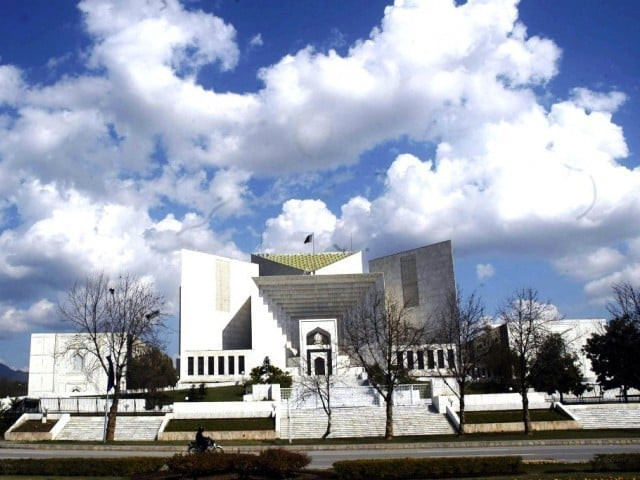Non-conforming use: SC orders shifting of top cops’ offices
Apex court rejects additional-attorney general’s plea seeking one year time

Supreme Court. PHOTO: EXPRESS/FILE
A two-judge bench of the apex court rejected a request by the a request by the Additional Attorney-General, Amir Rehman, seeking one year time for the relocation of the offices while hearing a case concerning the non-conforming use of residential buildings.
In the last hearing, held on February 10, the court had ordered the IGP Islamabad and IG Motorway Police to appear in person before the court.
The order was given after the CDA expressed its inability to remove the police offices.
Rehman informed the court that the office of the IGP was currently under construction.
“It will take around 18 months to complete the building,” he said.
Rejecting the plea, Justice Sheikh Azmat Saeed observed that the court could not allow different rules for the general public and for the government.
“Laws are equally applicable on both be it a common citizen or an IG of the police. Any discrimination will not be tolerated,” Justice Saeed observed.
The judge also questioned how the CDA sought the help of the police in raiding and sealing premises falling under the category of non-conforming use, but was reluctant to take action against the office of the head of the Islamabad Police.
The court adjourned the hearing till February 25.
Positive results
The SC’s intervention into the issue of land use norms violations in the capital has been yielding considerably positive results.
If the latest statistics provided by the capital’s civic agency to the apex court on Tuesday on the status of non-conforming use of residential units in Islamabad are taken as factual and true, then this illegal practice has seen a 26 per cent decrease since January 2015.
The SC took up the matter in November 2014 when a private firm challenged the decision of the Islamabad High Court (IHC). The IHC had restrained the said firm from continuing operations from a residential property in Sector F-7/1, thus bringing the issue to the attention of the apex court.
In its report, the Capital Development Authority claimed that at present, some 1,258 houses are being used for commercial purposes across Islamabad. This figure was 1,695 when the CDA submitted its first report to the apex court in January 2015.
The CDA says the report is compiled in light of a survey carried out this month. The report states that during its ongoing operation, the CDA sealed some 139 premises for the violation while 298 violations had been voluntarily removed by owners.
The survey shows that the F-series sectors [including F-6, F-7, F-8, F-10 and F-11] are worst affected, with a total of 586 violations reported. This is followed by I-series sectors [including I-8, I-9, and I-10] and four model villages [including Rawal Town, Margalla Town, Humak and Chak Shahzad] with a total of 344 violations. Meanwhile, G-series sectors [including G-6, G-7, G-8, G-9, G-10, G-11, and G-13] were shown to have a total of 328 violations.
Barricades and foreign missions
The report stated that the CDA had taken up the matter of barricades erected by foreign embassies operating in residential areas with the Ministry of Foreign Affairs. He said the issue of shifting of embassies to the designated areas of the Diplomatic Enclave in Sector G-5 was also taken up with the MoFA.
So far, the report said, some nine embassies have removed security barriers from their premises, while the CDA was also trying to pursue the case with the remaining foreign missions.
Published in The Express Tribune, February 24th, 2016.



















COMMENTS
Comments are moderated and generally will be posted if they are on-topic and not abusive.
For more information, please see our Comments FAQ